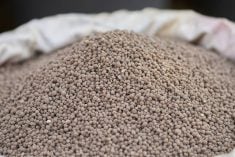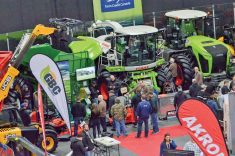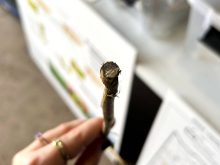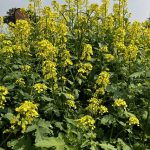A new project out of Alberta could link two distant sub-sectors of agriculture: aquaculture and canola processing.
The two-year research project will test the feasibility of using canola byproduct-supplemented fish feed in commercial aquaponics production, said project lead Nick Savidov, a senior research scientist at Lethbridge Polytechnic.
Why it matters: Manitoba’s aquaculture footprint is growing with incoming projects like a major Arctic char facility north of Winnipeg.
Read Also
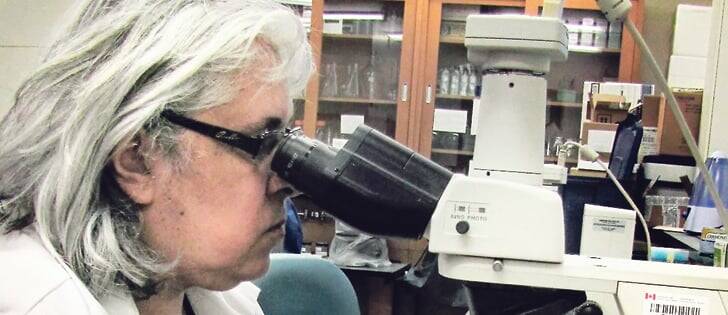
AAFC organic research program cut
Canada’s organic sector says the loss of a federal organic research program at Swift Current, Sask., will set the industry back.
If proven viable, the practice could save the aquaculture industry millions of dollars, said Savidov. Fish feed is by far the most expensive input in fish production and cutting even a fraction of that expense could help the industry.
“We project that we can save approximately 15, 20 per cent of the cost for (fish) farmers. It may sound like not much, but in fact fish feed comprises about 50, 60 per cent of the total cost of fish production.
“Even saving 10, 15 per cent of the cost will provide fish growers necessary profit margins to survive because they’re living on very small profit margins. I’m not an economist, but it’s a very, very important project for the industry because even if you improve the profit margin by five per cent, that will make a huge difference.”
The canola industry would have another revenue stream from sale of the canola meal created when oil is removed from seed.
“With domestic canola crushing capacity expanding, we’re looking forward to finding new ways to utilize canola meal and aquaculture is a natural fit,” wrote Chris Manchur, agronomy specialist and Canola Council of Canada research lead, in a news release.
“Helping enhance the sustainability of our food systems in Canada and beyond is a key goal for us, and we’re looking forward to the outcomes from this work happening in aquaponics right here on the Prairies.”
According to Lethbridge Polytechnic, aquaponics are based on the integrated culture of fish, plants and beneficial micro-organisms grown in a soil-less environment.
Savidov described aquaponics as a “closed-loop system” where fish and plants grow. Waste from the fish is a food source for micro-organisms that convert it into mineral nutrients used by the plants. The plants act as a natural filter, regenerating water quality for the fish.
“Basically, we are trying to set up here at Lethbridge Polytechnic a centre for sustainable food production system using aquaponics as an example of a sustainable agricultural practice,” said Savidov.
Fish meal made from dried and milled fish is a common source of protein. It’s expensive, not very sustainable and its production requires the killing of some fish to grow others, said Savidov.
Canola meal could change that and at the same time buoy both the aquaponics and canola sectors, he said, adding that the meal will take the form of a powder to be mixed at various content levels to see which concentrations work best. It will be tested on two common fish species: tilapia and trout.
“We believe that use of canola byproduct is very beneficial for both industries. It’s beneficial for canola growers because it provides an additional stream of revenue for canola growers when used as a part of fish feed.”
However, aquaponics and aquaculture in general likely have the most to gain from lower feed prices.
“The fish industry is going to be defeated because fish feed is very expensive,” said Savidov. “It’s actually the most expensive feed in livestock — all kinds of livestock — and using canola byproduct as a supplement or substitute for fish meal will bring prices down and will make the fish industry and fish farming more sustainable in the longer term.”
Keeping aquaponics sustainable is important, he said, because it’s likely the only existing food production system that can truly be called “zero waste.”
“In aquaponics, you don’t produce waste. Everything is utilized. Fish feed is utilized. Fish waste is utilized. It’s converted into the fertilizer for plants and both streams — solid and liquid — from fish production are utilized.”
The worldwide wild fish population is dropping, added Savidov.
“It’s a very, very dangerous situation. We are on the brink of dissipating some fish species.”
That would be a threat to humankind because fish are healthy to eat.
“You can talk to any dietitian, and they will tell you that eating fish is healthy. Fish is a healthy food compared to red meats.”
Savidov believes aquaponics may be the future of food, especially if other production systems fail.
“I’m not joking when I say that aquaponics or a similar closed-loop system may be the future of our human survival on this planet. We basically don’t invent anything. We copy the same mechanisms which govern natural ecosystems. We reproduce the relationships that-exist in nature between animals, microorganisms such as bacteria, micro-fungi, micro-algae and plants.
“It’s a cycle which has been existing in nature for years. And utilizing this approach, we are learning from nature how to be more sustainable.”
The nearly $300,000 project is funded by Canola Council of Canada, Alberta Canola, SaskOilseeds, Manitoba Canola Growers Association and the Government of Canada under the Sustainable Canadian Agricultural Partnership, a federal-provincial-territorial initiative.






